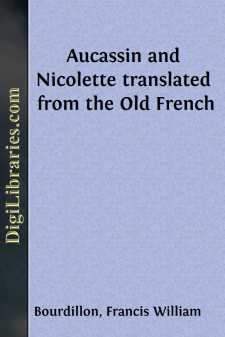Categories
- Antiques & Collectibles 13
- Architecture 36
- Art 48
- Bibles 22
- Biography & Autobiography 813
- Body, Mind & Spirit 142
- Business & Economics 28
- Children's Books 17
- Children's Fiction 14
- Computers 4
- Cooking 94
- Crafts & Hobbies 4
- Drama 346
- Education 46
- Family & Relationships 57
- Fiction 11829
- Games 19
- Gardening 17
- Health & Fitness 34
- History 1377
- House & Home 1
- Humor 147
- Juvenile Fiction 1873
- Juvenile Nonfiction 202
- Language Arts & Disciplines 88
- Law 16
- Literary Collections 686
- Literary Criticism 179
- Mathematics 13
- Medical 41
- Music 40
- Nature 179
- Non-Classifiable 1768
- Performing Arts 7
- Periodicals 1453
- Philosophy 64
- Photography 2
- Poetry 896
- Political Science 203
- Psychology 42
- Reference 154
- Religion 513
- Science 126
- Self-Help 84
- Social Science 81
- Sports & Recreation 34
- Study Aids 3
- Technology & Engineering 59
- Transportation 23
- Travel 463
- True Crime 29
Aucassin and Nicolette translated from the Old French
Categories:
Description:
Excerpt
INTRODUCTION
The story of Love, that simple theme with variations ad libitum, ad infinitum, is never old, never stale, never out-of-date. And as we sometimes seek rest from the brilliant audacities and complex passions of Wagner or Tschaikowsky in the tender simplicity of some ancient English air, so we occasionally turn with relief from the wit and insight and subtlety of our modern novelists to the old uncomplicated tales of faerie or romance, and find them after all more moving, more tender, even more real, than all the laboured realism of these photographic days. And here before us is of all pretty love-stories perhaps the prettiest. Idyllic as Daphnis and Chloe, romantic as Romeo and Juliet, tender as Undine, remote as Cupid and Psyche, yet with perpetual touches of actual life, and words that raise pictures; and lightened all through with a dainty playfulness, as if Ariel himself had hovered near all the time of its writing, and Puck now and again shot a whisper of suggestion.
Yet it is only of late years that the charm of this story has been truly appreciated. Composed probably in Northern France, about the close of the twelfth century,—the time of our own Angevin kings and the most brilliant period of Old-French literature,—it has survived only in a single manuscript of later date, where it is found hidden among a number of tales in verse less pleasing in subject and far less delightful in form. There it had lain unknown till discovered by M. de Sainte-Palaye, and printed by him in modernised French in 1752, one hundred and fifty years ago. There is no space here to follow its fortunes since. Even after this revival it was not till more than one hundred years later that it began to attain to any wide recognition. And in England this recognition has been mainly due to Mr Pater’s delightful essay in his early work “Studies in the History of the Renaissance.” Since the publication of this book in 1873, the story of Aucassin and Nicolette has had an ever-growing train of admirers both in England and America, and various translations have appeared on both sides of the Atlantic. It has also been translated into several other European languages, besides versions in modern French.
The story, so far as the simple old-world plot is concerned, is very probably not the original invention of whoever gave it this particular form, any more than were the plots of Shakespeare’s plays of his own devising. It seems likely that in origin it is Arabian or Moorish, and its birthplace not Provence but Spain. Possibly it sprung, as so much of the best poetry and story has sprung, from the touching of two races, and the part friction part fusion of two religions, in this case of the Moor and the Christian. There was in 1019 a Moorish king of Cordova named Alcazin. Turn this name into French and we have Aucassin. And to reverse the rôles of Christian and heathen is a very usual device for a story-teller transplanting a story from another country to his own. Though the scene is nominally laid in Provence there are a good many signs of a Spanish origin in the places mentioned. By Carthage is meant, not the city of Dido, but Carthagena; and thus the husband devised for Nicolette is “one of the greatest kings in all Spain.” Valence again might originally have been not the Valence on the Rhone, but Valence le grand, or Valentia. And it is curious to observe that Beaucaire is closely connected with Tarascon—a bridge across the Rhone unites them—and that this latter name nearly resembles Tarragona, a place which in other French romances is actually called Terrascoigne. The shipwreck which in the story takes place, impossibly, at Beaucaire, may have originally happened, quite naturally, at Tarragona. Even the nonsense-name, Torelore, might easily have had its rise in Torello. Again, though it has been shown that all modern reports of the Couvade as existing in Biscay have been founded only on the ancient assertion of Strabo, it is still remarkable that it is in this part of Europe alone that the custom has ever been found....


